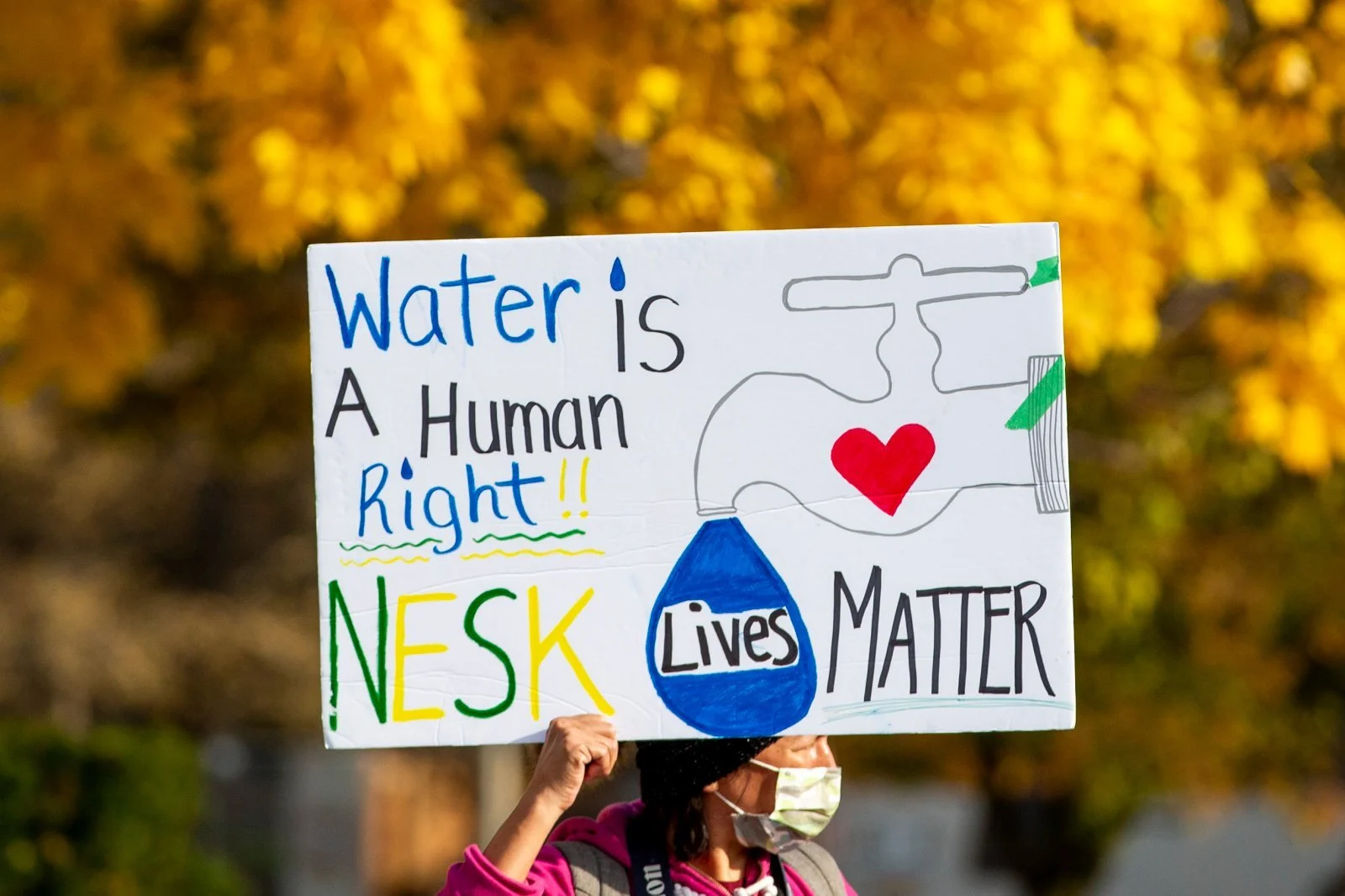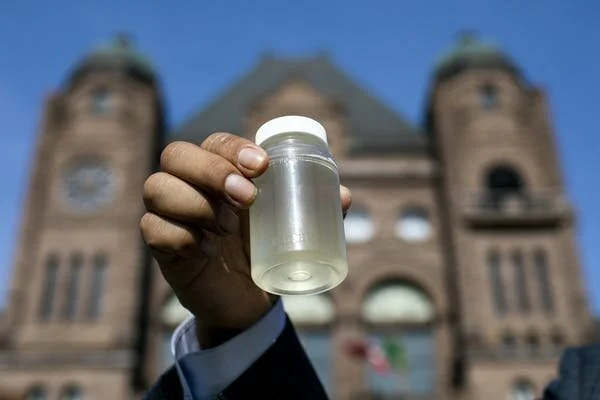Engineers must design with the risk of flooding in mind. But my research shows that if we also design with the concept of rain as a precious resource and plan to soak it up, floods will do less damage. These design ideas bring many co-benefits including cooling spaces in hot summers, cleaner air and healthier bodies, resilient food and flower gardens and access to more green space, which is accepted as beneficial for our mental health.
This new tech is said to filter 99% of ‘forever chemicals’ from water
The treatment was designed by researchers at the University of British Columbia, and it utilizes a silica-based material that can absorb up to 99 percent of the forever chemicals found in water. The PFAS are then removed from the material, which can be used again to remove even more toxins. The potential here is exceptional, allowing us to remove these dangerous chemicals from water completely.
New UBC water treatment zaps ‘forever chemicals’ for good
Engineers at the University of British Columbia have developed a new water treatment that removes “forever chemicals” from drinking water safely, efficiently – and for good. “Think Brita filter, but a thousand times better,” says UBC chemical and biological engineering professor Dr. Madjid Mohseni, who developed the technology. Forever chemicals, formally known as PFAS (per-and polyfluoroalkyl substances) are a large group of substances that make certain products non-stick or stain-resistant. There are more than 4,700 PFAS in use, mostly in raingear, non-stick cookware, stain repellents and firefighting foam. Research links these chemicals to a wide range of health problems including hormonal disruption, cardiovascular disease, developmental delays and cancer.
The Water Guys North Meets Clean Water Needs of Canadian Residents with Perfection
The Water Guys North has long been looking after and fulfilling the clean water requirements of Canadian residents. When Darin Lanktree, the founder of The Water Guys North, started working as a professional plumber in the Sudbury community, unmet water filtration needs there caught his attention. Fixing domestic water that had high amounts of iron and hydrogen sulphide became his passion. He took it as his responsibility to provide each Canadian resident with pure and safe water. As a member of the Canadian Water Quality Association and owner of the top Canadian water company, he along with other engineers in the team develops quality, suitable and essential water systems to satiate the diverse and unique water filtration needs of clients.
Clean water for Oneida still years away
As a years-long boil water advisory continues to drag out, there’s cautious optimism that clean water will be flowing to residents of Oneida Nation of the Thames. But it won’t be any time soon. In fact it could be a number of years yet before the community can lift its boil water advisory. "Over the holidays I heard from a lot of community members feeling a sense of hopelessness, but also a sense of guilt," said Oneida Councillor Brandon Doxtator, who oversees environmental issues for the community." Just taking a five minute shower has caused community members to be worried about their part of exacerbating the problem," he said.
UBCO engineers dive into local flood recovery, prevention
While infrastructure clean-up and repairs continue across the province after the extreme weather events of 2021, UBC Okanagan researchers have created measures to help municipalities mitigate damage from future climate-related disasters. “Communities across British Columbia have established strong policies and strategies to prepare and limit damage due to these extreme events, but policies related to post-disaster management are still in their infancy,” says Sadia Ishaq, a doctoral candidate in UBCO’s School of Engineering and lead author of a new paper that examines municipal risk management strategies.
What is nuclear fusion and why is it such a big deal?
Here on Earth, nuclear fusion is produced by fusing the elements deuterium and tritium. Deuterium is quite plentiful and can be found in water, but is most abundant in our oceans. Tritium, on the other hand, is less plentiful and is primarily found in our atmosphere, a result of cosmic radiation. Tritium is also made in nuclear explosions and is a byproduct from nuclear reactors.
Environment Canada links B.C. floods to human-induced climate change
Human-induced climate change “contributed substantially” to the atmospheric river and ensuing floods that devastated B.C. last year, a new study by Environment Canada scientists confirms, warning Canadians to brace for more of the same. “The chance this kind of flood will happen has increased by 100 to 300 per cent due to human influence,” Xuebin Zhang, a senior research scientist with Environment and Climate Change Canada, told Canada’s National Observer.
Authorities says Iqaluit water is still safe; engineers assessing plant
During the week of Jan. 24, a team of specialists including engineers, water quality chemist and environmental mediation experts were on site, according to the City of Iqaluit. The purpose of this visit was to investigate the condition of the water treatment tanks throughout the water treatment plant. These updates were provided by the City Feb. 7. Parts of this included taking concrete samples, a structural/material assessment, testing and water sampling. The investigation is ongoing.
Here's what a local lake looks like without water, as crews replace an outlet pipe near Summerland
Ever wondered what a local lake would look like without water? That's the situation at Isintok Lake in the hills above Summerland, B.C., as crews replace an outlet pipe. The District of Summerland, just north of Penticton, emptied the lake, which serves as one of many reservoirs for the town, to fix a century-old pipe in the Isintok Dam. "After years of doing video inspections in the outlet pipes of our dam, we did discover that there was significant leakage in the pipe in Isintok that was near 100 years old," Devon van der Meulen, water utilities manager at Summerland, told CBC's Daybreak South on Tuesday.
UBCO's water safety study
The water quality assessment technique considers all possible contaminants simultaneously while testing the water’s quality. The new procedure can compare water samples with hundreds of baselines, not just a few as is common today, to ensure water quality. “Our new technique provides decision-makers with important metrics to ensure their systems address unforeseen issues,” says Dr. Mian.
7 years later, 2 engineers face discipline for actions that led to Mt. Polley mine disaster
Seven years after Canada's largest tailings spill, the two engineers who were involved have been found in breach of their professional codes of conduct. On Aug. 4, 2014, a four-square-kilometre tailings pond breached at Mount Polley mine in central British Columbia, leaking vast amounts of water and effluent into Polley and Quesnel lakes and Hazeltine Creek.
How colonial systems have left some First Nations without drinking water
Rebecca Zagozewski, executive director of the Saskatchewan First Nations Water Association, said she has seen contractors save on costs when building water treatment plants on reserves by using obsolete parts and failing to include maintenance manuals, ventilation or chemical rooms, and bathrooms. “Engineering companies will put in their bids obviously as low as they can go,” said Zagozewski.
Former Neskantaga contractor accused of cutting corners in other First Nations
“They cut corners every day, every day,” said Justin Gee, vice-president of First Nations Engineering Services Ltd. Gee said he encountered these recurring problems while overseeing the work of a construction firm, Kingdom Construction Limited (KCL), building a water treatment plant 10 years ago in Wasauksing First Nation, along the eastern shore of Georgian Bay, about 250 kilometres north of Toronto. “You have to be on them every step of the way,” said Gee, who was the contract administrator on the project. “You can’t leave them on their own.”
Building trust in its tap water will be Neskantaga’s next big challenge
The chief of the First Nation in Northern Ontario that has suffered through the country’s longest continuous boil water advisory is hopeful that water coming out of the taps in the homes of Neskantaga will be safe to drink sometime in early 2021. The question now is: Even if public health and First Nation officials pronounce the water safe to drink, will anyone trust in the purity of what comes out of their taps?
Stuck in a hotel during a Christmas pandemic, Neskantaga members wait for water crisis to end
"This investigation is going to open a can of worms," Quisess said. "We want Canadians to know the full story. We want Canadians to know how the tax dollars are used." Neskantaga's plant was built in 1993 and has never adequately treated and disinfected water. A long-term drinking water advisory was put in place on Feb. 1, 1995, less than two years after the plant was commissioned. It's been in effect ever since.
Water crisis in First Nations communities runs deeper than long-term drinking water advisories
In October, more than 250 members of the Neskantaga First Nation were evacuated to Thunder Bay after an oily sheen was found on their reservoir. The discovery left the community, located in northern Ontario, without access to running water. The evacuation drew attention to the federal government’s 2015 commitment to end all on reserve long-term drinking water advisories (in place for more than one year) by March 31, 2021. Neskantaga has been living under a boil-water advisory for 26 years.
Ottawa to probe contractors hired to fix longest-standing boil water advisory
Indigenous Services Minister Marc Miller is preparing to launch a third-party investigation into the business practices of consultants and engineering companies hired to end Canada's longest-standing boil water advisory — a probe that could extend to other communities, CBC News has learned. "The problem is we have a system for delivering infrastructure that always goes with the lowest bidder," Angus said. "When you have a big-ticket item, like a water plant that's very expensive to build in a community, costs and corners get cut and that's the danger. Neskantaga has been a nightmare situation."
How liquid salt could be the answer to oilsands tailings ponds
Wastewater from oilsands mining operations have long been a challenge for Canada's energy industry, much of it ending up in industrial tailings ponds. But scientists and engineers at the University of Calgary are taking aim at eliminating watery tailings from the oilsands production process with the help of specialized liquid salt. Hot water is used in oilsands mining operations to extract the oily bitumen from the sand, with the resulting wastewater ending up in tailings ponds to settle and later be reused. Alberta has an estimated 1.3 trillion litres of fluid tailings sitting in tailings ponds.




















